Sounds like Heroin, German physicians prescribed the methamphetamine drug Pervitin
How addiction changes your brain 03:14
Now, meth, cocaine and even opiates have been referenced in association with German soldiers in a new book by German author Norman Ohler, "Blitzed: Drugs in the Third Reich,"
begin quote from:
http://www.cnn.com/2016/12/19/health/nazi-drugs-meth-cocaine-painkillers/?iid=ob_homepage_deskrecommended_pool
What drugs were the Nazis on, anyway?
By Jacqueline Howard, CNN
Updated 4:17 AM ET, Mon December 19, 2016
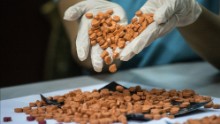
Photos: Schedule I drugs
MDMA, or Ecstasy, is a synthetic psychoactive drug with a similar chemical structure as methamphetamine, a stimulant, and mescaline, a hallucinogen. The drug, sold as a tablet, acts as both a stimulant and a psychedelic, often elevating users' experiences to intensely happy states. In large doses, Ecstasy can interfere with the body's metabolism and its ability to regulate temperature, potentially leading to a sharp increase in temperature (hyperthermia) that could be fatal.
Hide Caption
4 of 7

Photos: Schedule I drugs
Peyote, or mescaline, is a psychedelic drug derived from a cactus that grows in desert areas of Texas and Mexico. Peyote cacti are circular and spineless and come in multiple colors, and they grow disc-shaped flowers. The "buttons" are harvested, dried and chewed or brewed in tea. Peyote users can experience hallucinations, intense anxiety, and poor eating and sleeping.
Hide Caption
5 of 7
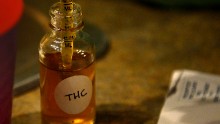
Photos: Schedule I drugs
The main psychoactive component in marijuana, tetrahydrocannabinol (THC) acts as a cannabinoid chemical in our brains, activating the body's pleasure, movement and concentration functions. THC triggers the release of dopamine, the chemical in our brains that signals a reward, which evokes euphoria and a trance-like state. The effects of THC include impaired motor skills, as well as potential long-term health risks such as memory decline and schizophrenia.
Hide Caption
6 of 7
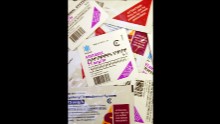
Photos: Schedule I drugs
Fentanyl itself is a Schedule II drug, typically used as part of anesthesia treatment in medical settings. But when the opioid is dangerously combined with various chemical compounds, such as 3-methylfentanyl, it is classified as a Schedule I drug. Fentanyl is 50 to 100 times more potent than morphine; ingesting a tiny amount can be instantly fatal. The drug can be made more cheaply than heroin, which makes it even more accessible to poor communities. Fentanyl is sometimes mistaken for less-potent heroin, leading to increased risk of overdose.
Hide Caption
7 of 7

Photos: Schedule I drugs
Schedule I is the most restrictive category of drugs determined by the Drug Enforcement Administration, ranked the highest in abuse potential and addictive quality.
A highly addictive opioid, heroin originated in Southeast and Southwest Asia, Mexico and Colombia. The drug is made by extracting juice from a poppy flower and transforming the juice into an opium and morphine state, and finally a heroin form. Heroin is usually sold as white or brownish powder, in varying degrees of potency, and is ingested by injecting or snorting. Users may experience an intense high followed by sudden fatigue and confusion.
A highly addictive opioid, heroin originated in Southeast and Southwest Asia, Mexico and Colombia. The drug is made by extracting juice from a poppy flower and transforming the juice into an opium and morphine state, and finally a heroin form. Heroin is usually sold as white or brownish powder, in varying degrees of potency, and is ingested by injecting or snorting. Users may experience an intense high followed by sudden fatigue and confusion.
Hide Caption
1 of 7

Photos: Schedule I drugs
LSD is a potent hallucinogen made from lysergic acid, a chemical found in ergot fungi. Odorless, colorless and bitter in taste, LSD is usually consumed as a drug-laced blotter paper placed under the tongue. The effects of LSD vary: Dilated pupils, elevated heart rate and blood pressure, and feelings of extreme euphoria, fear or depression are common. A user's judgment is distorted when on an LSD "trip," potentially putting them in dangerous situations.
Hide Caption
2 of 7

Photos: Schedule I drugs
Marijuana is a psychoactive drug that acts on the cannabinoid receptors in our brains, evoking a euphoric high. The drug is sold as green or brown dried leaves from the hemp plant Cannabis sativa and is typically rolled into a cigarette or inhaled from a bong. In recent years, certain cities and states have approved marijuana for recreational or medical use, but the DEA hasn't recognized the drug as having a function in medicine.
Hide Caption
3 of 7

Photos: Schedule I drugs
MDMA, or Ecstasy, is a synthetic psychoactive drug with a similar chemical structure as methamphetamine, a stimulant, and mescaline, a hallucinogen. The drug, sold as a tablet, acts as both a stimulant and a psychedelic, often elevating users' experiences to intensely happy states. In large doses, Ecstasy can interfere with the body's metabolism and its ability to regulate temperature, potentially leading to a sharp increase in temperature (hyperthermia) that could be fatal.
Hide Caption
4 of 7

Photos: Schedule I drugs
Peyote, or mescaline, is a psychedelic drug derived from a cactus that grows in desert areas of Texas and Mexico. Peyote cacti are circular and spineless and come in multiple colors, and they grow disc-shaped flowers. The "buttons" are harvested, dried and chewed or brewed in tea. Peyote users can experience hallucinations, intense anxiety, and poor eating and sleeping.
Hide Caption
5 of 7

Photos: Schedule I drugs
The main psychoactive component in marijuana, tetrahydrocannabinol (THC) acts as a cannabinoid chemical in our brains, activating the body's pleasure, movement and concentration functions. THC triggers the release of dopamine, the chemical in our brains that signals a reward, which evokes euphoria and a trance-like state. The effects of THC include impaired motor skills, as well as potential long-term health risks such as memory decline and schizophrenia.
Hide Caption
6 of 7

Photos: Schedule I drugs
Fentanyl itself is a Schedule II drug, typically used as part of anesthesia treatment in medical settings. But when the opioid is dangerously combined with various chemical compounds, such as 3-methylfentanyl, it is classified as a Schedule I drug. Fentanyl is 50 to 100 times more potent than morphine; ingesting a tiny amount can be instantly fatal. The drug can be made more cheaply than heroin, which makes it even more accessible to poor communities. Fentanyl is sometimes mistaken for less-potent heroin, leading to increased risk of overdose.
Hide Caption
7 of 7

Photos: Schedule I drugs
Schedule I is the most restrictive category of drugs determined by the Drug Enforcement Administration, ranked the highest in abuse potential and addictive quality.
A highly addictive opioid, heroin originated in Southeast and Southwest Asia, Mexico and Colombia. The drug is made by extracting juice from a poppy flower and transforming the juice into an opium and morphine state, and finally a heroin form. Heroin is usually sold as white or brownish powder, in varying degrees of potency, and is ingested by injecting or snorting. Users may experience an intense high followed by sudden fatigue and confusion.
A highly addictive opioid, heroin originated in Southeast and Southwest Asia, Mexico and Colombia. The drug is made by extracting juice from a poppy flower and transforming the juice into an opium and morphine state, and finally a heroin form. Heroin is usually sold as white or brownish powder, in varying degrees of potency, and is ingested by injecting or snorting. Users may experience an intense high followed by sudden fatigue and confusion.
Hide Caption
1 of 7

Photos: Schedule I drugs
LSD is a potent hallucinogen made from lysergic acid, a chemical found in ergot fungi. Odorless, colorless and bitter in taste, LSD is usually consumed as a drug-laced blotter paper placed under the tongue. The effects of LSD vary: Dilated pupils, elevated heart rate and blood pressure, and feelings of extreme euphoria, fear or depression are common. A user's judgment is distorted when on an LSD "trip," potentially putting them in dangerous situations.
Hide Caption
2 of 7

Photos: Schedule I drugs
Marijuana is a psychoactive drug that acts on the cannabinoid receptors in our brains, evoking a euphoric high. The drug is sold as green or brown dried leaves from the hemp plant Cannabis sativa and is typically rolled into a cigarette or inhaled from a bong. In recent years, certain cities and states have approved marijuana for recreational or medical use, but the DEA hasn't recognized the drug as having a function in medicine.
Hide Caption
3 of 7

Photos: Schedule I drugs
MDMA, or Ecstasy, is a synthetic psychoactive drug with a similar chemical structure as methamphetamine, a stimulant, and mescaline, a hallucinogen. The drug, sold as a tablet, acts as both a stimulant and a psychedelic, often elevating users' experiences to intensely happy states. In large doses, Ecstasy can interfere with the body's metabolism and its ability to regulate temperature, potentially leading to a sharp increase in temperature (hyperthermia) that could be fatal.
Hide Caption
4 of 7



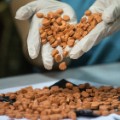

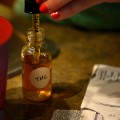
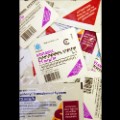
Story highlights
- Nazi officials took meth, cocaine, painkillers, according to a forthcoming book
- Drug use during war isn't just "a Nazi thing," one expert says
(CNN)Historians have long known that Nazi soldiers took drugs -- but what exactly did these drugs do to their bodies and brains?
German physicians prescribed the methamphetamine drug Pervitin when World War II troops felt tired or depressed and sought to enhance their energy, according to research.
Nazi leader Adolf Hitler inhaled powdered cocaine to treat sinus problems, as suggested in historical documents of his medical records (PDF).
However, "we do not know how extensive methamphetamine consumption was in the Third Reich in an exact quantitative sense; there are indications, but I doubt the suggestions of some that the whole war machine was fueled by these drugs. That's just not how these drugs work," said Stephen Snelders, a historian at Utrecht University in the Netherlands who has studied the history of drugs in Nazi Germany.
"I think that the drugs were pragmatically used and administered by (military) physicians and by soldiers and civilian consumers, but the evidence remains scanty for most of the war," he added.
Now, meth, cocaine and even opiates have been referenced in association with German soldiers in a new book by German author Norman Ohler, "Blitzed: Drugs in the Third Reich," set to publish in the United States in March, but already released in other parts of the world, including the UK.
"Norman Ohler's Blitzed depicts the pervasive drug culture that allegedly developed in Germany's Third Reich," wrote Paul Weindling, a research professor at Oxford Brookes University, in an article in the journal Nature in October.
"Nazi officials took high-performance drugs such as methamphetamine hydrochloride (crystal meth) and cocaine. German military units and aviators were dosed with the patent methamphetamine-based drug Pervitin (manufactured in Germany from 1937) to improve operational efficiency. And drugs such as Pervitin and metabolic stimulants were tried out on students, military recruits and, eventually, in concentration camps," Weindling wrote. "Questions remain, however, over precisely how the drugs were tested, prescribed, distributed and used."
Even though "they're affecting the same systems in slightly different ways," meth and cocaine boost the release of two main neurotransmitters in the brain -- dopamine and serotonin -- which give users a sense of energy and euphoria, said Kristen Keefe, a professor of pharmacology and toxicology at the University of Utah.
Opioids, which also were mentioned in the book, would have provided pain relief, some sense of euphoria and relaxation, Keefe said.
"If you have soldiers out in the field, you don't want them to feel pain," she said. "The negative obviously is that opioids readily can kill you if you overdose on them."
In the United States, methamphetamine is classified as a Schedule II drug, meaning it has a high potential for abuse and is only available through a prescription for medical use that cannot be refilled. Cocaine and opioids are also Schedule II drugs.
Yet such drugs -- especially types of amphetamine -- have been widely used throughout history in military engagements, Keefe said.
German, English, American and Japanese governments gave their military personnel methamphetamine to enhance endurance and alertness and ward off fatigue during World War II, according to the Methamphetamine and Other Illicit Drug Education project at the University of Arizona.
More recently, US officials said last year that some jihadist fighters in Syria may be using the drug Captagon, an amphetamine pill that can provide a surge of energy and a euphoric high.
In 2002, two American fighter pilots accidentally released a bomb that killed four Canadian soldiers in southern Afghanistan. A lawyer for one of the pilots argued that the Air Force pressured the pilots to take amphetamines, also known as "go pills," which impacted their judgment.
The lawyer's argument was rejected in the actual hearing, Keefe said.
"The pilots were using Dexedrine, or dextroamphetamine, as 'go pills' to keep them awake and alert," Keefe said.
"Historically, it has been used to provide this increase in energy and ability to stay awake in pilots, military pilots ... troops," she said. "So, it's not a Nazi thing, as much as we might want it to be."



No comments:
Post a Comment